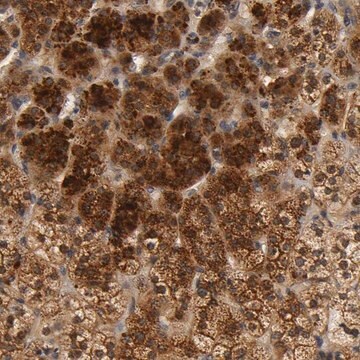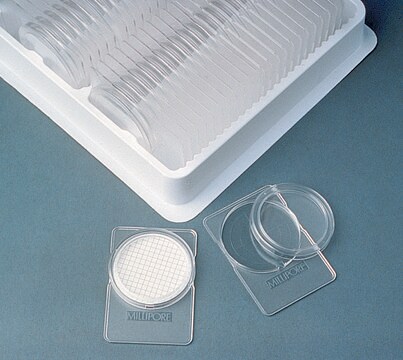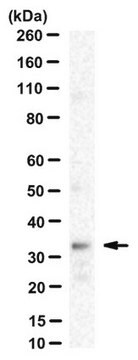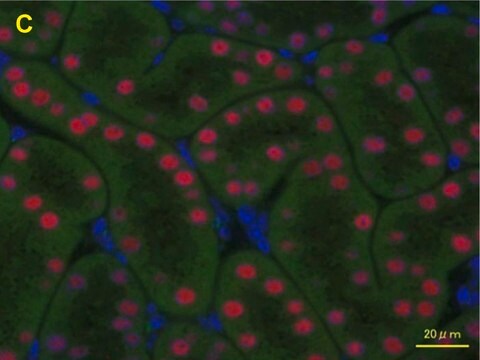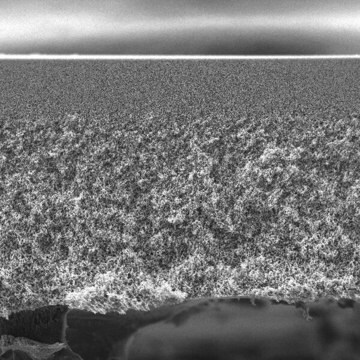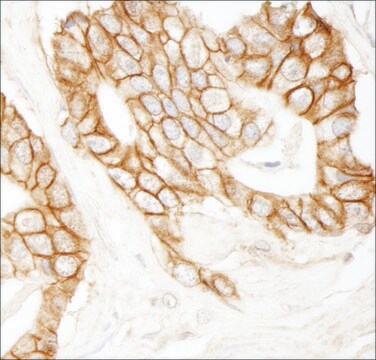推荐产品
生物源
mouse
品質等級
抗體表格
purified immunoglobulin
抗體產品種類
primary antibodies
無性繁殖
9D5, monoclonal
物種活性
hamster
技術
immunocytochemistry: suitable
western blot: suitable
同型
IgG2bκ
NCBI登錄號
UniProt登錄號
目標翻譯後修改
unmodified
基因資訊
hamster ... Scap(100689048)
一般說明
Sterol regulatory element-binding protein cleavage-activating protein (UniProt P97260; also known as SCAP, SREBP cleavage-activating protein) is encoded by the SCAP gene (Gene ID 100689048) in hamster species. SCAP mediates the activation of membrane-bound transcription factors SREBPs (sterol-regulatory element binding proteins) for transcribing genes encoding cholesterol biosynthetic enzymes. In sterol-deprived cells, SCAP escorts SREBPs from ER to Golgi, where active fragments of SREBPs are released from membrane by proteolysis. Sterol accumulation inuduces a negative regulatory mechanism, where SCAP becomes bound by Insigs and trapped in the ER, preventing further delivery of SREBPs to the Golgi for proteolytic release. SCAP spans the ER membrane eight times (a.a. 19-39, 280-300, 313-333, 345-365, 402-422, 424-444, 519-539, 709-729) with
4 lumenal and 5 cytoplasmic regions, having both its N- and C-terminal ends at the cytoplasmic side (a.a. 1-18 & 730-1276). The C-terminal domain of SCAP mediates association with SREBPs, while transmembrane helices 2–6 comprise the sterol-sensing domain that mediates sterol-induced binding of SCAP to Insigs. Mutations within the sterol-sensing region disrupt Insig binding and prevent sterol-mediated ER retention of SCAP-SREBP.
4 lumenal and 5 cytoplasmic regions, having both its N- and C-terminal ends at the cytoplasmic side (a.a. 1-18 & 730-1276). The C-terminal domain of SCAP mediates association with SREBPs, while transmembrane helices 2–6 comprise the sterol-sensing domain that mediates sterol-induced binding of SCAP to Insigs. Mutations within the sterol-sensing region disrupt Insig binding and prevent sterol-mediated ER retention of SCAP-SREBP.
特異性
Clone 9D5 detected the target band in lysate and membrane extract from CHO-K1 cells, but not from the SCAP-deficient SRD-13A CHO cell line.
免疫原
Epitope: The fourth lumenal domain.
His-tagged recombinant fragment corresponding to the fourth lumenal domain of hamster SCAP.
應用
Anti-SCAP Antibody, clone 9D5 is an antibody against SCAP for use in Western Blotting, Immunocytochemistry.
Western Blotting Analysis: 5 µg/mL from a representative lot detected SCAP in 25 µg of whole cell lysate and 50 µg of membrane extract from CHO-K1 cells, but not from the SCAP-deficient SRD-13A CHO cells (Courtesy of Linda Donnelly, Department of Molecular Genetics, UT Southwestern Medical Center, Dallas, TX, USA).
Western Blotting Analysis: A representative lot detected exogenously expressed SCAP co-immunoprecipitated with the exogenously expressed Insig-1 and Insig-2 upon 25-hydroxycholesterol (25-HC) treatment of a SCAP-deficient CHO cell line SRD-13A that had been transfected to co-express SCAP with either myc-tagged Insig-1 or Insig-2 (Lee, P.C., and DeBose-Boyd, R.A. (2010). J. Lipid Res. 51(1):192-201).
Western Blotting Analysis: Representative lots detected similar level of SCAP in the membrane extracts from CHO cells with or without SREBP processing inhibitor 25-hydroxycholesterol (25-HC) treatment regardless whether the cells′ 25-HC-resistant status (Lee, P.C., and DeBose-Boyd, R.A. (2010). J. Lipid Res. 51(1):192-201; Lee, P.C., et al. (2007). J. Lipid Res. 48(9):1944-1954).
Western Blotting Analysis: A representative lot detected the endogenous SCAP immunoprecipitated from CHO cell lysate by a polyclonal SCAP antibody (Sakai, J., et al. (1997). J. Biol. Chem. 272(32):20213-20221).
Immunocytochemistry Analysis: A representative lot localized the overexpressed hamster SCAP at ER and nuclear envelope by fluorescent immunocytochemistry staining of 3% paraformaldehyde-fixed, 0.01% saponin-permeabilized CHO stable transfectants (Sakai, J., et al. (1997). J. Biol. Chem. 272(32):20213-20221).
Western Blotting Analysis: A representative lot detected exogenously expressed SCAP co-immunoprecipitated with the exogenously expressed Insig-1 and Insig-2 upon 25-hydroxycholesterol (25-HC) treatment of a SCAP-deficient CHO cell line SRD-13A that had been transfected to co-express SCAP with either myc-tagged Insig-1 or Insig-2 (Lee, P.C., and DeBose-Boyd, R.A. (2010). J. Lipid Res. 51(1):192-201).
Western Blotting Analysis: Representative lots detected similar level of SCAP in the membrane extracts from CHO cells with or without SREBP processing inhibitor 25-hydroxycholesterol (25-HC) treatment regardless whether the cells′ 25-HC-resistant status (Lee, P.C., and DeBose-Boyd, R.A. (2010). J. Lipid Res. 51(1):192-201; Lee, P.C., et al. (2007). J. Lipid Res. 48(9):1944-1954).
Western Blotting Analysis: A representative lot detected the endogenous SCAP immunoprecipitated from CHO cell lysate by a polyclonal SCAP antibody (Sakai, J., et al. (1997). J. Biol. Chem. 272(32):20213-20221).
Immunocytochemistry Analysis: A representative lot localized the overexpressed hamster SCAP at ER and nuclear envelope by fluorescent immunocytochemistry staining of 3% paraformaldehyde-fixed, 0.01% saponin-permeabilized CHO stable transfectants (Sakai, J., et al. (1997). J. Biol. Chem. 272(32):20213-20221).
品質
Identity Confirmation by Isotyping Test.
Isotyping Analysis: The identity of this monoclonal antibody is confirmed by isotyping test to be IgG2bκ.
Isotyping Analysis: The identity of this monoclonal antibody is confirmed by isotyping test to be IgG2bκ.
標靶描述
~150 kDa observed. Target band size appears larger than the calculated molecular weight of 139.5 kDa due to glycosylation. Uncharacterized band(s) may appear in some lysates.
外觀
Format: Purified
其他說明
Concentration: Please refer to lot specific datasheet.
未找到合适的产品?
试试我们的产品选型工具.
儲存類別代碼
12 - Non Combustible Liquids
水污染物質分類(WGK)
WGK 1
閃點(°F)
Not applicable
閃點(°C)
Not applicable
我们的科学家团队拥有各种研究领域经验,包括生命科学、材料科学、化学合成、色谱、分析及许多其他领域.
联系技术服务部门